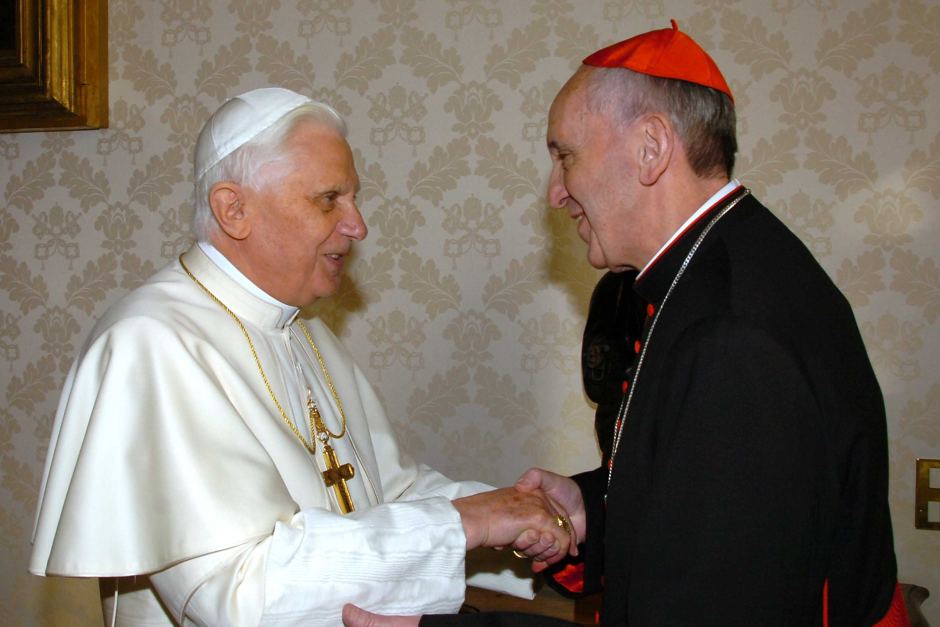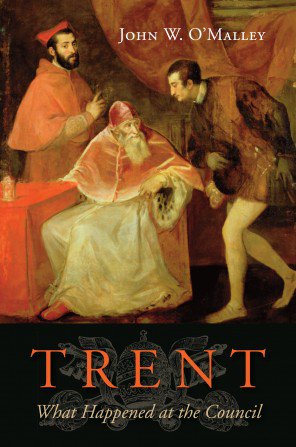
There are papacies and there are radical papacies. Nobody notices the really radical papacies, because too many things off their radar change and are absorbed into the mainstream. Decades later people are like, “Haven’t we always done it this way?” As a counterexample of a radical papacy I’d like to present the tenure of the soon to be St. John XXIII (see: Faggioli’s new biography). He was quite conservative. He went through all the proper channels in convening Vatican II. Is there anything more boring and conservative than calling together a council? The Council went back to the ancient practice of using vernacular as the Eastern-Rite Catholics had done since time immemorial. In What Happened at Vatican II O’Malley recounts how these groups, with the real old-timer liturgies, were really behind the bold effort to bring back the vulgar languages. The last great rash of innovations, in reaction to the Reformers (but also borrowing a great deal from them), came to us with Trent. Some would even say that Trent ruined the traditional liturgy by streamlining and standardizing it. Well, to be honest, Vatican I was also a watershed moment. (Is it true that some of the opponents of the doctrine were spirited off during crucial portions of the debate, or even vote, in great Rabelaisian Catholic fashion? Why aren’t there more recent historical accounts of this Council? Is this a Masonic plot of some sort?) Anyway, the objectors were wrong since in the long run infallibility is a good thing. because papal primacy has, for the most part, helped the Roman church keep its head above the nationalist temptations of the Orthodox, not to mention all the relentlessly fissiparous Protestant denominations. This is because Catholicism, thanks to the papacy, is greatly independent of the interests of any one of the illiberal liberal regimes and totalitarian ones too.

Now, for all intents and purposes, the papacy of Benedict XVI didn’t rock the innovation boat all that much. He started out by unintentionally alienating everybody (with the Regensburg address) who hadn’t already been scandalously alienated from him by the John L. Allen biography that preceded his election and was updated after his election without much of a tone change. Benedict XVI then alienated whatever is left of the Anglican church by instating an elaborate poaching scheme. Then came the SSPX fiasco, a partial dialing back of the clock on liturgy, and the Prada shoes, which managed to alienate several groups of Catholics. All in all, this was par for the course, looking good as a stodgily conservative Catholic papacy. But was it? Signs were afoot that things weren’t as comfy as the central “conservative” narrative would have it. Papa Ratzinger (grates on the ear a bit doesn’t it?) continued his cordial exchanges with the atheist philosopher Jurgen Habermas (these weren’t merely random interviews). He cracked down relentlessly on child sex abusers. He met with the always charming Hans Kung. What’s more, sometime around 2008, I can’t remember the exact date, the pope made a show of approval for Gustavo Gutierrez, author of the seminal study A Theology of Liberation (and my favorite On Job). Finally, he started a Twitter account! Don’t these make him look a little more like the guy whose Introduction to Christianity was banned by Cardinal Wyszynski in the Warsaw archdiocese for being too liberal when it first came out in Polish translation? Then came the last big radical papal blow on my birthday. Is there anything more radical than an abdication when there is no serious personal scandal or incompetency? This is totally unprecedented. It breaks any and all hermeneutics of continuity!

What worries me most about it is how much the fallout from this radical papacy might affect the future of not only how the Bishop of Rome is perceived, but also how the Catholic Church will conduct its affairs. Does this precedent not expose the Vatican to pressure both within and without? Could the next step be an involuntary abdication? Does it not open the door for pressure from outside entities, whether national or corporate, to force future popes out who might prove to be inconvenient? All of these questions would have seemed unthinkable after the papacy of a much more tradition-bound gradual reformer like John Paul II. Despite all these reservations I continue to read Papa Ratzinger’s Eschatology: Death and Eternal Life, which, as you might have guessed is a traditional, yet radically modern, account of the Last Things. I came to Ratzinger on these issues after I recently read John E. Thiel’s Icons of Hope: The Last Things in the Catholic Imagination. Thiel’s book made me wonder what the heck happened to Purgatory in the 20th century. But that’s a subject for a future post,.. In the meantime you should take a look at what’s going on in contemporary theological thinking on the topics of heaven and hell. Oh, and Happy 87th Birthday (!), uhm… ex-pope, pope-emeritus, or whatever the preferred nomenclature might be. It’s so radical, we don’t have the words for it.











